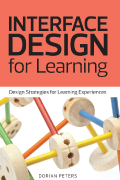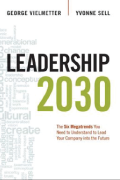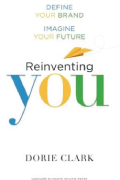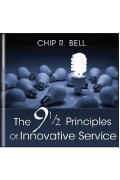TD Magazine Article
E-Learning Is No House of Cards
A review of Interface Design for Learning: Design Strategies for Learning Experiences by Dorian Peters
Tue Apr 08 2014

Interface Design for Learning: Design Strategies for Learning Experiences
By Dorian Peters
New Riders, 266 pp., $39.99
"Strange as it sounds," writes Peters, "the future of education is now as much in the hands of digital designers and programmers as it is in the hands of teachers." But how can designers build digital environments that support both the cognitive and emotional sides of learning experiences?
Peters, founder of the eLearning Network of Australasia and director of online strategy at the University of Sydney, offers readers evidence-based methods to design educational games, apps, and multimedia interfaces that improve learning outcomes. Although the book focuses mainly on designing the digital architecture and resources that support e-learning, it also covers strategies for designing the learning content itself.
The book opens with a discussion on the latest research on how we learn, and then takes readers on a future-oriented tour of the e-learning landscape—a comprehensive, enlightening chapter that's worth reading in itself. Chapter 4 is a crash course in all things interface design, in which Peters masterfully guides readers through the most salient concepts for designing learning interfaces.
Chapters 5 through 10 show readers how to construct the scaffolding for effective e-learning, addressing social and mobile learning, educational games, the role of emotion in learning, and the "interior design" of digital learning spaces. Peters first presents the research on which her strategies are built, and then delves into the strategies themselves: clearly written and actionable chunks of advice that readers can easily implement in their work.
The strategies in each chapter are organized into subcategories ("strategies to reduce overload"; "strategies for improving social presence"; "strategies for effective use of video and animation") to help readers find and absorb those most relevant to them. For example, in her chapter on social learning, Peters shows readers how to leverage social influence to encourage participation ("Design testimonials, ratings, and reviews to ... encourage users to contribute") or design for all online learning personalities ("A passive learner might log in once or twice to watch the seminar videos or browse discussion. ... A leader might ... create subgroups, recruit participants, answer questions, or moderate discussions").
The author's tone is conversational and engaging, and although the book's own "interface" is clean and attractive, Peters somehow fills it with an entire industry's worth of knowledge. Sidebars contain screenshots of e-learning interfaces, accompanied by the author's helpful commentary, which are sure to provide inspiration for readers. She also includes reference lists at the end of each chapter, as well as a curated bibliography of classic resources at the end of the book.
Masterfully written by a true leader of the field, Interface Design for Learning is highly recommended for improving the strategic direction and the individual work products of learning professionals everywhere.
Leadership 2030: The Six Megatrends You Need to Understand to Lead Your Company Into the Future

George Vielmetter and Yvonne Sell
AMACOM, 240 pp., $27.95
Leaders often are told to look up from their daily firefights and never-ending small tasks, and consider the big picture. Knowing how difficult this is to do, Vielmetter and Sell do it for them in Leadership 2030. Their book shows readers how six global trends will dramatically affect organizations' markets, cultures, systems, and processes. With illustrative research and case studies, Leadership 2030 presents the competencies leaders must develop to drive successful, future-forward businesses. Leaders wondering if their three- and five-year plans (and beyond) are sustainable will find answers in this insightful read.
Reinventing You: Define Your Brand, Imagine Your Future

Dorie Clark
Harvard Business Review Press, 225 pp., $25
Reinventing You is a comprehensive guide that takes readers by the hand, helping them navigate every step from where they are to the future they've imagined. Clark masterfully weaves together instruction and inspiration in a road map for successful personal and professional rebranding. The book is easy to read and easy to act upon. Drawing examples from familiar political figures and others, Clark presents how-tos, offering questions, frameworks, and challenges that transform reading into a hands-on interactive experience. Reinventing You goes beyond the basics of rebranding to address contemporary issues such as technology and social media.
The 9½ Principles of Innovative Service

Chip R. Bell
Simple Truths, 112 pp., $39.99
This is an easy read, packed with examples and quotes that inspire. The multitude of personal anecdotes and professional vignettes from Bell are extraordinary in the fact that they are all doable in whatever field you are in. As a trainer, you could use this book in numerous ways, including having participants discuss how to apply these principles on the job. Applying some of these principles will elevate your organization's level of service. 9½ Principles is a go-to resource for innovative service ideas and quotes for you to use in your training programs and on the job.
What's on Tamar Elkeles's Bookshelf?
The Chief Learning Officer: Driving Value Within a Changing Organization Through Learning and Development by Tamar Elkeles and Jack J. Phillips. It's my book—how could it not be on my bookshelf? It provides practical examples and advice about how to lead a world-class learning organization. It's a must-read for anyone in the learning profession.
Lean In by Sheryl Sandberg. This book has real insights, advice, and perspective that are important for both women and men in organizations. Her experiences are relevant and extremely common in today's workplaces.
Roasting in Hell's Kitchen: Temper Tantrums, F Words, and the Pursuit of Perfection by Gordon Ramsay. Get a personal look into a top chef's life and philosophy on bringing out the best in others. His passion, drive, and focus on excellence provide great perspective about developing people.
